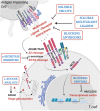Specific Targeting of Notch Ligand-Receptor Interactions to Modulate Immune Responses: A Review of Clinical and Preclinical Findings
- PMID: 32922403
- PMCID: PMC7456812
- DOI: 10.3389/fimmu.2020.01958
Specific Targeting of Notch Ligand-Receptor Interactions to Modulate Immune Responses: A Review of Clinical and Preclinical Findings
Abstract
Understanding and targeting Notch signaling effectively has long been valued in the field of cancer and other immune disorders. Here, we discuss key discoveries at the intersection of Notch signaling, cancer and immunology. While there is a plethora of Notch targeting agents tested in vitro, in vivo and in clinic, undesirable off-target effects and therapy-related toxicities have been significant obstacles. We make a case for the clinical application of ligand-derived and affinity modifying compounds as novel therapeutic agents and discuss major research findings with an emphasis on Notch ligand-specific modulation of immune responses.
Keywords: Notch signaling; Notch therapeutics; T cells; antigen presenting cells; cancer immunotherapy; engineered Notch ligands; immunosurveillance; tumor escape.
Copyright © 2020 Goruganthu, Shanker, Dikov and Carbone.
Figures


Similar articles
-
Notch Signaling in Myeloid Cells as a Regulator of Tumor Immune Responses.Front Immunol. 2018 Jun 4;9:1288. doi: 10.3389/fimmu.2018.01288. eCollection 2018. Front Immunol. 2018. PMID: 29915603 Free PMC article. Review.
-
Immunological Effects of Conventional Chemotherapy and Targeted Anticancer Agents.Cancer Cell. 2015 Dec 14;28(6):690-714. doi: 10.1016/j.ccell.2015.10.012. Cancer Cell. 2015. PMID: 26678337 Review.
-
CD8+ cytotoxic T lymphocytes in cancer immunotherapy: A review.J Cell Physiol. 2019 Jun;234(6):8509-8521. doi: 10.1002/jcp.27782. Epub 2018 Nov 22. J Cell Physiol. 2019. PMID: 30520029 Review.
-
Epigenetic Reprogramming of CD4+ Helper T Cells as a Strategy to Improve Anticancer Immunotherapy.Front Immunol. 2021 Jun 28;12:669992. doi: 10.3389/fimmu.2021.669992. eCollection 2021. Front Immunol. 2021. PMID: 34262562 Free PMC article. Review.
-
Notch Pathway: A Journey from Notching Phenotypes to Cancer Immunotherapy.Adv Exp Med Biol. 2021;1287:201-222. doi: 10.1007/978-3-030-55031-8_13. Adv Exp Med Biol. 2021. PMID: 33034034 Review.
Cited by
-
Prognostic value of PLEKHA4 and its correlation with tumor-infiltrating immune cells in breast cancer: a comprehensive study based on bioinformatics and clinical analysis validation.Transl Cancer Res. 2024 Sep 30;13(9):4957-4972. doi: 10.21037/tcr-24-67. Epub 2024 Aug 23. Transl Cancer Res. 2024. PMID: 39430828 Free PMC article.
-
Examining the contribution of Notch signaling to lung disease development.Naunyn Schmiedebergs Arch Pharmacol. 2024 Sep;397(9):6337-6349. doi: 10.1007/s00210-024-03105-8. Epub 2024 Apr 23. Naunyn Schmiedebergs Arch Pharmacol. 2024. PMID: 38652281 Review.
-
Engineering tissue morphogenesis: taking it up a Notch.Trends Biotechnol. 2022 Aug;40(8):945-957. doi: 10.1016/j.tibtech.2022.01.007. Epub 2022 Feb 15. Trends Biotechnol. 2022. PMID: 35181146 Free PMC article. Review.
-
At the Crossroads of Molecular Biology and Immunology: Molecular Pathways for Immunological Targeting of Head and Neck Squamous Cell Carcinoma.Front Oral Health. 2021 Mar 5;2:647980. doi: 10.3389/froh.2021.647980. eCollection 2021. Front Oral Health. 2021. PMID: 35047999 Free PMC article. Review.
-
A novel biomarker of COVI-19: MMP8 emerged by integrated bulk RNAseq and single-cell sequencing.Sci Rep. 2024 Dec 28;14(1):31086. doi: 10.1038/s41598-024-82227-8. Sci Rep. 2024. PMID: 39730651 Free PMC article.
References
Publication types
MeSH terms
Substances
Grants and funding
LinkOut - more resources
Full Text Sources
Medical

